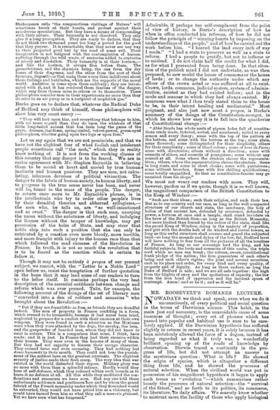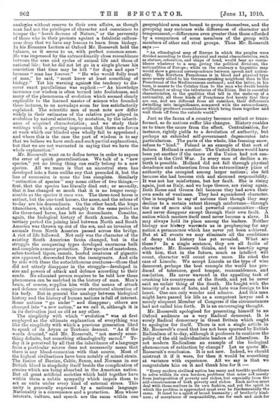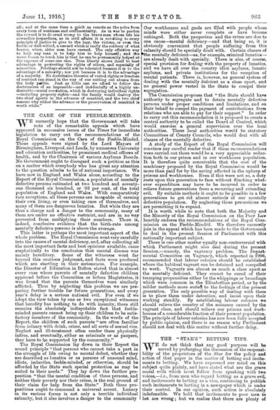MR. ROOSEVELT'S ROMANES LECI UEE. N OWADAYS we think and speak,
even when we do it unconsciously, of every political and social question in the terms of Darwinian science. This habit, in the main just and necessary, is the unavoidable cause of some looseness of thought ; every set of phrases which has passed into popular and habitual use is sure to be care- lessly applied. If the Darwinian hypothesis has suffered slightly in esteem in recent years, it is solely because it has been mistakenly allowed the force of a dogma, instead of being regarded as what it truly was, a wonderfully brilliant opening up of the roads of knowledge by observation. Darwin traced a continuity in the pro- gress of life, but did not attempt an answer to the mysterious question : What is life ? He showed the origin of species, which is altogether a different thing from life, and he showed the processes of natural selection. When the civilised world was put in possession of his magnificent hypothesis it began to apply such terms as " evolution "—which summarises rather loosely the processes of natural selection—the " survival of the fittest," and so forth to its politics, its commerce, its literature, 'its daily affairs. We scarcely know whether to mistrust more the facility of those who apply biological analogies without reserve to their own affairs, as though man had not the privileges of character and conscience to temper the " harsh decrees of Nature," or the perversity of those who in their protests against a fatalistic callous- ness deny that we have any lessons to learn from biology. In his Romanes Lecture at Oxford Mr. Roosevelt held the balance, as it seems to us, with perfect common-sense. He was impressed by the extraordinarily close resemblance between the eras and cycles of animal life and those of national life ; but he did not let go in a single phrase his conviction that time may be left " for dogs and apes " because " man has forever?' " He who would fully treat of man," he said, " must know at least something of biology." Yet his warning against the tendency to dis- cover exact parallelisms was explicit :—" As knowledge increases our wisdom is often turned into foolishness, and many of the phenomena of evolution which seemed clearly explicable to the learned master of science who founded these lectures, to us nowadays seem far less satisfactorily explained. The scientific men of most note now differ widely in their estimates of the relative parts played in evolution by natural selection, by mutation, by the inherit- ance of acquired characteristics ; and we study their writings with a growing impression that there are forces at work which our blinded eyes wholly fail to apprehend ; and where this is the case the part of wisdom is to say that we believe we have such-and-such partial explanations, but that we are not warranted in saying that we have the whole explanation."
Mr. Roosevelt went on to define terms in order to expose the error of quick generalisations. We talk of a " new species," yet no living thing can really belong to a new species. All we mean is that an ancestral stem has developed into a form unlike any that preceded it, but the line of succession is none the less complete. Similarly " extinction of species " may mean either of two things,— first, that the species has literally died out; or secondly, that it has changed so much that it is no longer recog- nisable as the species it once was. The three-toed horse is extinct, but the one-toed horses, the asses, and the zebras of to-day are his descendants. On the other hand, the huge titanothere, which existed roughly in the same period as the three-toed horse, has left no descendants. Consider, again, the biological history of South America. In the tertiary period the joining land between North and South America was thrown up out of the sea, and an invasion of animals from North America passed across the bridge. A riot of life followed. Not only was the character of the existing South American fauna changed, but in the struggle the conquering types developed enormous bulk and complete armour protection. New species of mastodons, sabre-toothed tigers, camels, hoofed creatures of gigantic size appeared, descended from the immigrants. And side by side with these the autochthonous creatures—those that did not utterly disappear in the struggle—developed in size and powers of attack and defence according to their needs. No educated person requires to be told how these phenomena can be matched in the history of man. Man's brain, of course, supplies him with the means of attack and defence without a conspicuous structural alteration of his body. But in general the analogy between biological history and the history of human nations is full of interest. Some nations " go under" and disappear; others are changed into " a new nation," as we call it, although it is in its derivation just as old as any other. The simplicity with which " evolution " was at first employed as the ultimate explanation of everything was like the simplicity with which a previous generation liked to speak of its Aryan or Teutonic descent. " As if the words denoted," said Mr. Roosevelt, " not merely some- thing definite, but something ethnologically sacred." To- day it is perceived by all that the inheritance of &language from a particular source does not necessarily mean that there is any blood-connexion with that source. Most of the highest civilisations have been notably of mixed strain. The fusion of Iberian, Celtic, Saxon, and Norman in our British blood is simplicity itself beside the complication of strains which are being absorbed in the American nation. But all great artificial societies which hold together have within them a subtle sympathy which impels them to act as units under every kind of external stress. This unity is generally expressed by a national language. Nationality is a convenience and a protection. Men whose interests, culture, and speech are the same within one geographical area are bound to group themselves, and the grouping may embrace wide differences of character and temperament—differences even greater than those afforded by a comparison of some members of the group with members of other and rival groups. Thus Mr. Roosevelt says :— " An ethnological map of Europe in which the peoples were divided according to their physical and racial characteristics, such as stature, coloration, and shape of head, would bear no resem- blance whatever to a map giving the political divisions, the nationalities of Europe ; while on the contrary a linguistic map would show a general correspondence between speech and nation- ality. The Northern Frenchman is in blood and physical type more nearly allied to his German-speaking neighbour than to the Frenchman of the Mediterranean seaboard; and the litter, in his turn, is nearer to the Catalan than to the man who dwells beside the Channel or along the tributaries of the Rhine. But in essential characteristics, in the qualities that tell in the make-up of a nationality, all these kinds of Frenchmen feel keenly that they are one, and are different from all outsiders, their differences dwindling into insignificance, compared with the extraordinary, artificially produced resemblances which bring them together and wall them off from the outside world."
Just as the fauna of a country becomes extinct or trans- formed, so do nations suffer like changes. History enables us to trace the cause from the effect. Centralisation, for instance, rightly yields to a devolution of authority, but perhaps an extended self-government degenerates into particularism. The parts of the whole, like freezing snow, refuse to " bind." Poland is an example of that sort of failure. Holland is another. The United States would have been yet another if the cause of the Union had not con- quered in the Civil War. In every case of decline a re- birth is possible. Holland did not fall through physical decadence and exhaustion from the extraordinary place of authority she occupied among larger nations ; she fell because she had become rich and shunned responsibility. It was not her misfortune, but her fault. She is rising again, just as Italy, and we hope Greece, are rising again. Both Rome and Greece fell because they had sown their own seeds of weakness. They had squandered character. One is tempted to say of nations that though they may decline to a certain extent through misfortune—through the rise of more able and powerful communities—they need never disappear except through their own fault. A nation which masters itself need never become a slave. It may always hold its place among the leaders. Neither biology nor history warrants us in prophesying for any nation a permanence which has never yet been achieved. But at all events we may eliminate all the conditions of decay that history has yet revealed. What are these ? Ia a single sentence, they are all faults of character. Mr. Roosevelt thinks, and we heartily agree with him, that in the future, much as intellect will count, character will count even more. He cited the case of Lincoln. We accept Lincoln as the type of wise democrat, perhaps the best example the world has pro- duced of tolerance, good temper, reasonableness, and resolution. He never wavered in the appalling task of crushing his countrymen of the South, and yet he never said an unfair thing of the South. He fought with the tenacity of a man of hate, and yet hate was foreign to his heart. One can only wonder and admire. And this man might have passed his life as a competent lawyer and a merely eloquent Member of Congress if the circumstances had not called him forth. It is an encouraging thought.
Mr. Roosevelt apologised for presenting himself to an Oxford audience as a, very Radical democrat. It is surely Radical democracy in Great Britain which ought to apologise for itself. There is not a single article in Mr. Roosevelt's creed that has not been spurned by British Radicalism of to-day, although it professes to continue the policy of the old individualistic leaders of Liberalism. Is not modern Radicalism an example of the biological phenomenon of extinction by change ? Let us quote Mr. Roosevelt's conclusion. It is not new. Indeed, we should mistrust it if it were, for then it would be something at variance with experience. All we say is that we congratulate him on it and thank him for it :— " Every modern civilised nation has many and terrible problems to solve within its own borders, problems that arise noZ merely from juxtaposition of poverty and riches, but especially from the self-consciousness of both poverty and riches. Each nation must deal with these matters in its own fashion, and yet the spirit in which the problem is approached must ever be fundamentally the same. It must be a spirit of broad humanity ; of brotherly kind- ness; of acceptance of responsibility, one for each and each for all ; and at the same time a gpirit as remote as the poles from every form of weakness and sentimentality. As in war to pardon the coward is to do cruel wrong to the brave roan whose life his cowardice jeopardises, so in civil affairs it is revolting to every principle of justice to give to the lazy, the vicious, or even the feeble dull-witted, a reward which is really the robbery of what braver, wiser, abler men have earned. The only effective way to help any man is to help him to help himself ; and the worst lesson to teach him is that he ran be permanently helped at the expense of some one else. True liberty shows itself to best advantage in protecting the rights of others, and especially of minorities. Privilege should nett be tolerated because it is to the advantage of a minority; nor yet because it is to the advantage of a majority. No doctrinaire theories of vested rights or freedom of contract can stand in the way of our cutting out abuses from the body politic. Just as little can we afford to follow the doctrinaires of an impossible—and incidentally of a highly un- desirable—social revolution, which in destroying individual rights —including property rights—and the family would destroy the two chief agents in the advance of mankind, and the two chief reasons why either the advance or the preservation of mankind is worth while."
















































 Previous page
Previous page